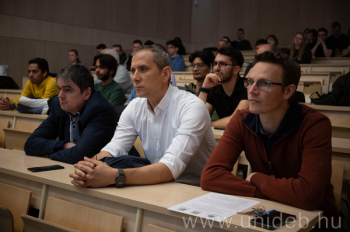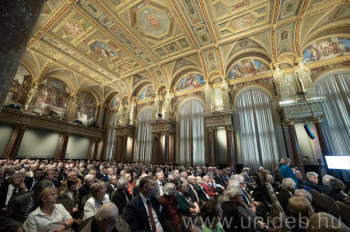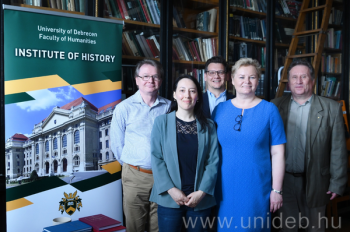Genetic and genome biology research was the focus of the Central European Genome Stability Meeting, an international conference organized by the Faculty of Pharmacy of the University of Debrecen. The English-language event, held at the Learning Center, featured 32 experts giving presentations in 7 sessions and seeking collaboration opportunities.
Hírek Science címkével
The Faculty of Pharmacy of the University of Debrecen (DE GYTK) has been active in researching therapeutic options and compounds that could later be used to develop a new generation of drugs to treat certain cancer and immunological diseases, diabetes or even Alzheimer's. The most recent world-leading findings and results of this research team have been published in one of the most prestigious scientific journals.
A record number of students attended 4th International Academic Conference at the University of Debrecen. Organized by International Student Union (ISU), the event was attended by over 400 students, who listened to presentations on academic work in the faculties, TDK opportunities and the institution's talent management programs.
Issues such as the emergence of virtualization and cloud computing, as well as the role of artificial intelligence in networking, were discussed recently by experts at the innovation workshop hosted by Department of Information Systems and Networks of the Faculty of Informatics at the University of Debrecen. This event provided a comprehensive overview of the current challenges and opportunities related to modern IT systems and network technologies.
It was the Portuguese city of Porto that hosted this year’s CARPE international symposium between the 14th and the 16th of May, which a delegation of twenty-two representatives from the University of Debrecen attended, headed by László Csernoch, Vice-Rector for Academic Affairs. Our institution joined CARPE, (Consortium on Applied Research and Professional Education) in 2015, which had been established by a group of universities with a strong profile in applied research in 2011.
In the framework of a thematic conference, the members of a research team of the University of Debrecen (UD), supported by Nemzeti Kutatási Kiválóság Program STARTING Kutatópályázat [STARTING Call for Research Proposals of the National Research Excellence Program], presented their research project plans for the years ahead, the purpose of which is to shed new light on the significance of the Balkans. The kick-off workshop of the project, titled Geopolitical Trends and Balkan Strategy of the Austro-Hungarian Monarchy: Individual Sources and Foreign Policy Actors (1878-1918), was held on Thursday at the Institute of History of the Faculty of Humanities of UD.
Doctoral students who have been awarded GTIDEA Kiválósági PhD Ösztöndíj [GTIDEA Excellence Ph.D. Scholarship] could get acquainted with world-renowned oncology researcher Rene Bernards and his experiences of a career in research. During the course of Professor Bernards' visit to Országos Onkológiai Intézet [National Institute of Oncology], which occurred in the framework of a program coordinated by the international organization EURACAN, the young scientists were also informed about the latest developments and research trends in oncology.
New academicians were elected and announced at the 199th General Assembly of the Hungarian Academy of Sciences (MTA). Five professors of the University of Debrecen (UD) were elected to act as corresponding members, while four of the hitherto corresponding members became full members of the Academy.
An international network of research groups led by the University of Debrecen has won funding to develop a new type of drug that is hoped to bring breakthroughs in the chemotherapy treatment of cancer. The NextNano4Cancer project brings together experts from Taiwan, France, Spain, Romania and Hungary.
The Institute of History of the Faculty of Humanities of the University of Debrecen (UD) and the Department of Military History of the Nicolaus Copernicus University of Toruń recently hosted a joint conference for the first time under the title Modern History Symposium. The symposium provided an opportunity for specialists in modern history to present and share the latest findings of their research efforts.









